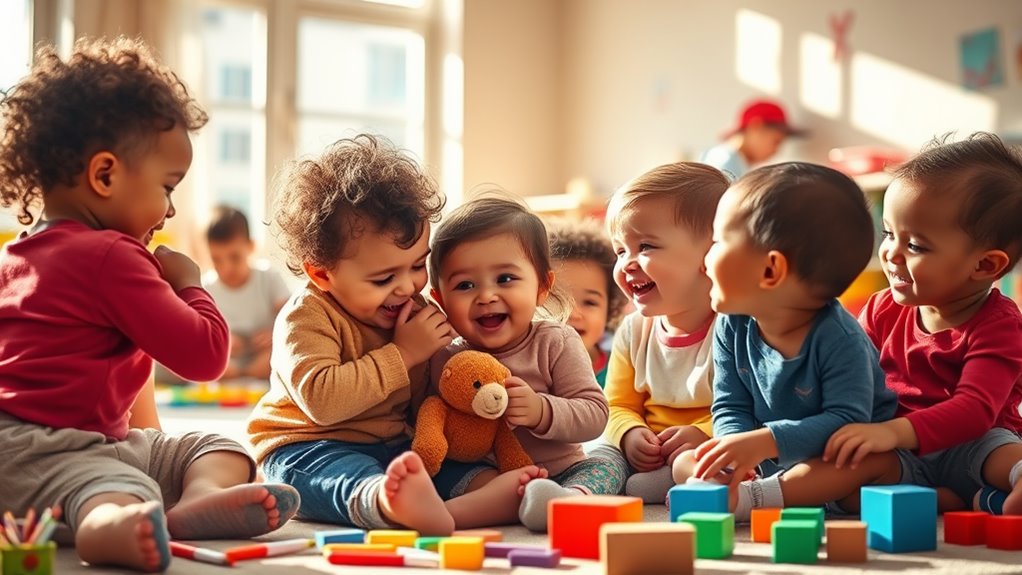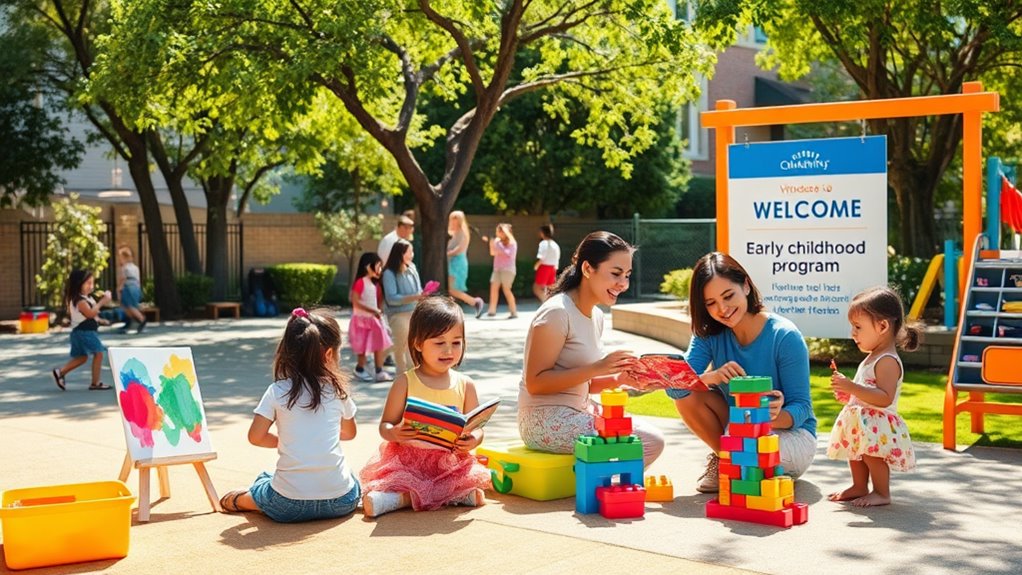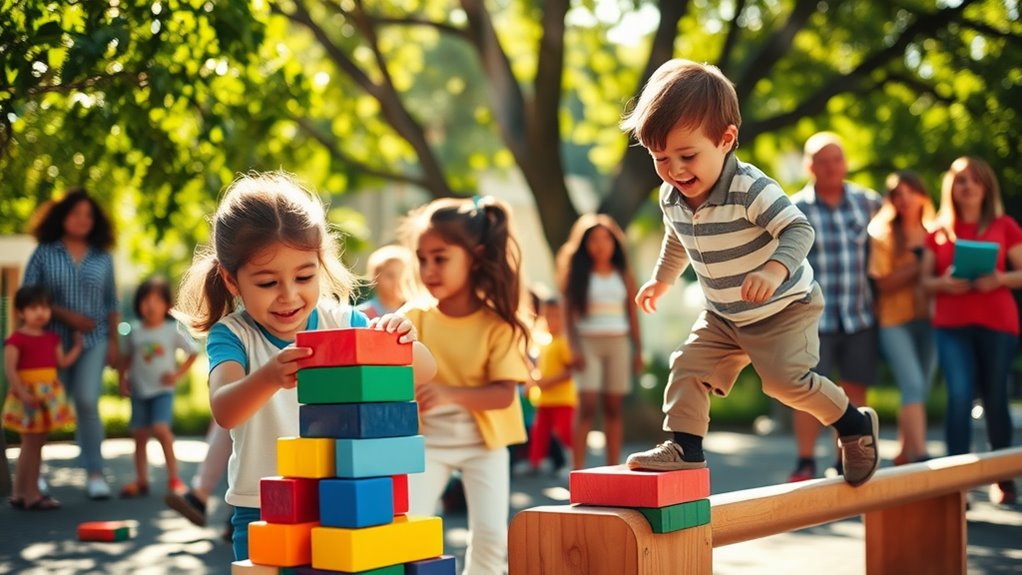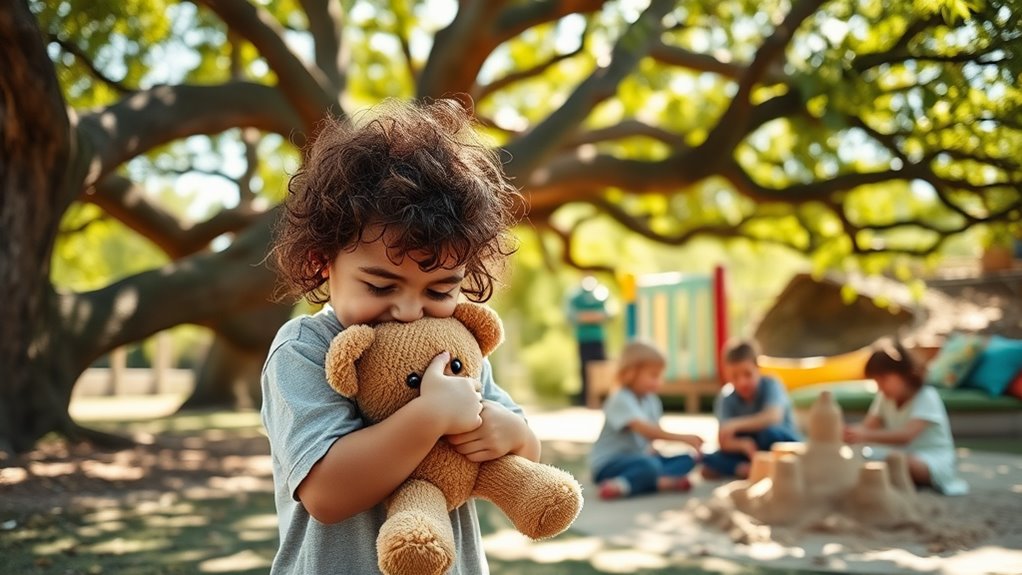Emotional development in early childhood is super important because it helps you understand and manage your feelings. When kids learn to say, "I'm upset," instead of throwing a tantrum, they're building strong emotional skills. These skills not only support friendships but also boost mental health later in life. By recognizing emotions in themselves and others, kids develop empathy and social know-how. Plus, having positive coping strategies makes them feel more confident. So, creating a safe space for kids to express their feelings is key! Stick around, and you'll discover even more ways to help nurture those feelings!
Understanding Emotional Development
How do children learn to navigate their feelings? It's a bit like learning to ride a bike—wobbly at first, but with practice, they get the hang of it! Emotional development is all about understanding and managing feelings. When kids experience emotions like happiness, sadness, or anger, they're actually learning how to express themselves.
Imagine a child who feels frustrated. Instead of throwing a tantrum, they might learn to say, "I'm upset!" That's a huge step!
You play a big role in this process. By talking to your child about their feelings, you help them label what they're experiencing. You can say, "It's okay to feel sad when your friend can't play." This not only validates their emotions but also teaches them it's normal to feel different things.
As they grow, kids start to understand that feelings can change, just like the weather. Sometimes it's sunny, and other times it's stormy.
They'll learn coping strategies, like taking deep breaths or counting to ten, which are essential tools for managing emotions. So, keep the conversations going and encourage them—after all, emotional skills are just as important as math and reading!
Key Stages in Early Childhood
What key milestones define emotional development in early childhood?
First up, you'll notice that toddlers begin to express their feelings more clearly around 2 years old. They might throw a tantrum when they can't have that cookie right away! This is their way of showing excitement or frustration.
Next, as they reach ages 3 to 4, kids start to recognize emotions in others. You might catch your little one saying, "Mommy looks sad!" This shows they're beginning to empathize, which is super important.
By around ages 4 to 5, children develop a better understanding of their own feelings. They can identify when they feel happy, sad, or even a little scared. They might say, "I'm nervous about my first day of school!" This is a big step!
Finally, as they approach age 6, kids start to manage their emotions more effectively. They learn to calm themselves or talk about their feelings, which helps them build strong relationships.
Impact on Social Skills
Emotional development in early childhood plays a significant role in shaping social skills. When you learn to understand and express your feelings, it's like getting a superpower for making friends! You start to recognize when others are happy, sad, or upset, and that helps you respond to them better.
For instance, if you see a friend who's feeling down, your emotional skills kick in, and you might offer a comforting word or a hug. This means you're building empathy, which is super important for creating strong friendships.
As you grow, you'll find that kids who can express their feelings tend to work better in groups, share toys more willingly, and resolve conflicts without turning into mini-dragons!
Plus, being emotionally aware helps you feel more confident when talking to others. You're less likely to feel shy or anxious in social situations.
So, next time you see a bunch of kids laughing together, remember that their ability to connect comes from their emotional development. It's like a secret ingredient in the recipe for friendship!
Influence on Mental Health
While you mightn't realize it, the way you handle your feelings as a child can have a lasting impact on your mental health. When you learn to express your emotions, you're not just letting out steam; you're also building a strong foundation for your future.
If you struggle to manage anger or sadness, it can lead to bigger issues later on, like anxiety or depression. Imagine trying to ride a bike without knowing how to balance—you might end up falling quite a bit!
Feeling understood and supported during tough times is essential. If you often feel neglected or overwhelmed, it can shape how you view yourself and the world around you. You might start to feel like you're not good enough, or that it's hard to trust others.
This can affect how you connect with friends and family as you grow.
On the flip side, when you learn to cope with emotions positively, it boosts your self-esteem and helps you handle challenges better. It's like having a secret superpower!
Strategies for Supporting Development
To foster healthy emotional development in early childhood, it's crucial to create an environment where children feel safe to express their feelings. Start by encouraging open conversations about emotions. When your child shares their feelings, listen actively and validate their experiences. You might say, "I understand you're sad about your toy being broken. That can be really tough!" This helps them feel heard.
Next, model emotional expression yourself. Show how you deal with your feelings, whether you're happy, sad, or frustrated. Kids learn a lot by watching you! You could say, "I'm feeling a bit overwhelmed today, so I'm going to take a deep breath."
Incorporate play into emotional learning, too! Use games or storybooks that explore feelings. This way, children can relate and talk about emotions in a fun way.
Lastly, create routines that provide stability. Kids thrive on predictability, and knowing what to expect helps them feel secure.





